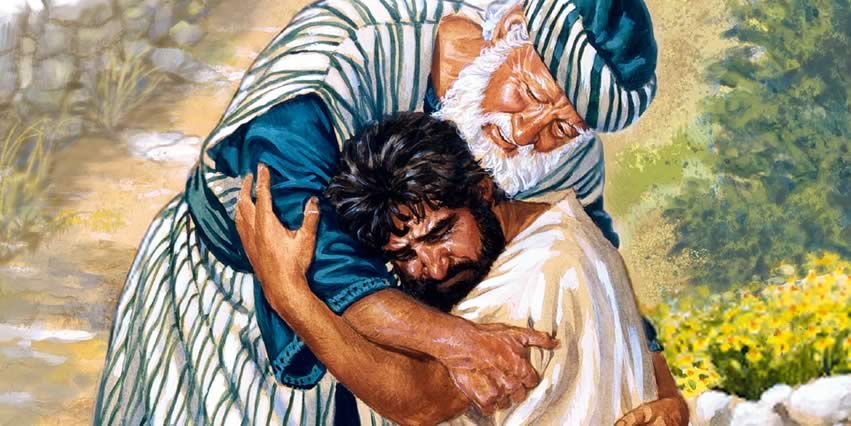(the same of the one in Portuguese)
Today I'm very excited to write here. It's because some time ago I thought about writing here about the sermon on the mountain of Jesus, but it happened that I wrote a few things, but I did not go any further. Glad you did not! Why? Because I would have left out important information that I did not have and now I do have.
I will not be here writing every day about the sermon on the mountain, but I will tell you the joy I had in understanding some beatitudes that before I was not sure what they meant. Maybe you have doubts as well.
Today I have this information because I went to Bible study today, and guess what? Yes! We will be studying the Sermon on the Mount, which is very good. Maybe every now and then I'll tell you something new to me that might be new to you too.
Well, I'll make a parallel here with the story of the prodigal son. Let's focus on it. The parable is written in Luke 15: 11-32. As many people have the story more or less in their minds I will not put it here. Let's get right to the point. What happened? The guy left the house full of money (his inheritance) and he toasted everything in another country. What happened? Unlucky enough, the place he was passing the time was in crisis (let's put it that way). Everyone knows that just leaving your own country and going to another or even to tourist make some changing in one's mind. Second, if you go through difficulties, you change even more. And that's exactly what happened to the guy. This is where the parallel begins between the first verses of the Sermon on the Mount Matthew 5 - 7. Let's look at this story with both sides - material and spiritual ways. So, this guy goes into poverty, but not just material poverty but spiritual poverty. What does that mean? It means that you look at yourself and see yourself miserable before God, unable to do anything, to eat, to work, to have fun. Imagine the poorest person in the world, now think of it as your spirit before God.
That's what Jesus meant in Matthew 5: 3. And so was the prodigal son. Poor. When you realize yourself poor, and incapable and look to God, you cry. You cry because no matter what you do, you are not able to be saved (Mt 5: 4); you with your own strength you cannot justify yourself before God, then you cry and acknowledge that you need Him, your Savior. And it was what the prodigal son did, he recognized his poverty and wept. What did he do? He thought about his father (who in this story demonstrates the character of God), the son thinks about returning home, because even the employees of his father are in better conditions than he at that moment. He decided to humble himself before his father, and acknowledge his errors (Mt 5: 5); and his father receiveth him, as our Father in heaven.
This process that the prodigal son passed transformed his life. When he got back home, he won't be the same. All this experience that he had, all his crying, his humiliation, they changed him. Although he had asked his father the least, just to be like his employees, his father, in turn, did so much more what the had asked for. His father offered him everything back. So much more than he deserved.
So when we decide to want to be citizens of the heavens, we need to have that kind of transformation in our character. And only then, can we receive the fruits of this transformation. That by the way, alone, without the help of God, we cannot achieve. Jesus speaks to us of mercy, pure heart, peacemakers, and for all this, we rejoice at being persecuted. Let me explain these last things quickly.
If we want mercy, we must give mercy, right? So, before you deal harshly with someone because you did something wrong, or hurt us or such, how about having a little more mercy. After all, no one is perfect, and one day you can be the one in that position. Pure of heart? What? It is what goes there in your thoughts. We most of the time cannot control our thoughts, right? But when we go through daily transformations like the prodigal son passed before God, God helps us to control our thoughts. When we humble ourselves, when we recognize our tiny size before God, He can make it happens.
Peacemakers, okay you can avoid fights, you can help people make peace between them, but think a little further. We also have on the to-do list peacemaking between men and God. Show people that the sin that drives us away from God can be forgiven once they repent before Him. This is being peacemakers. And obviously, in doing so, we will be persecuted because the peace and love that we preach are not the same as common sense preaches. None of it is. And none of this comes naturally. All this is the gift of God.
The transformation happens from the inside out. Do you want all this? I certainly desire. I want to be a citizen of heaven, and I want to go through this daily transformation. I know it must be daily, because being human is to fall into the same error several times, and only God can teach us mercy and GRACE that was how the father received the prodigal son when he returned. The father did not let him be an employee, as he asked for. But he gave much more than he asked and deserved. This is called GRACE.

Comments
Post a Comment